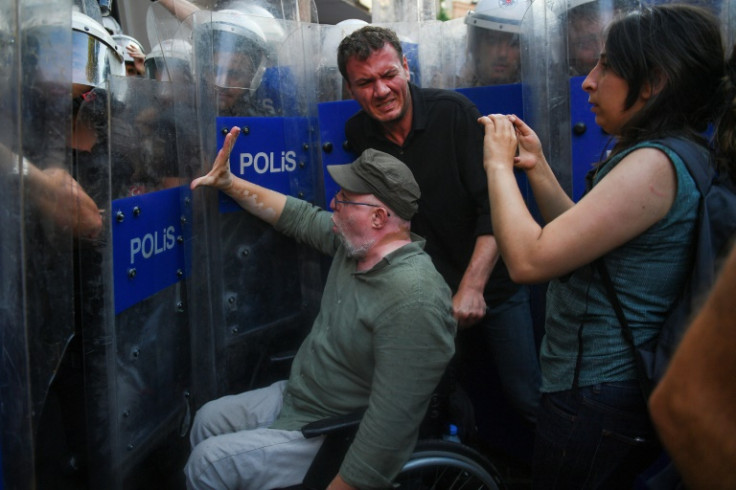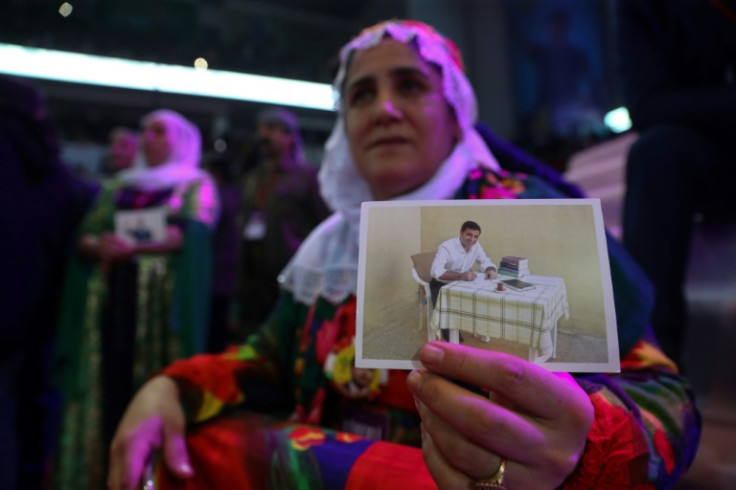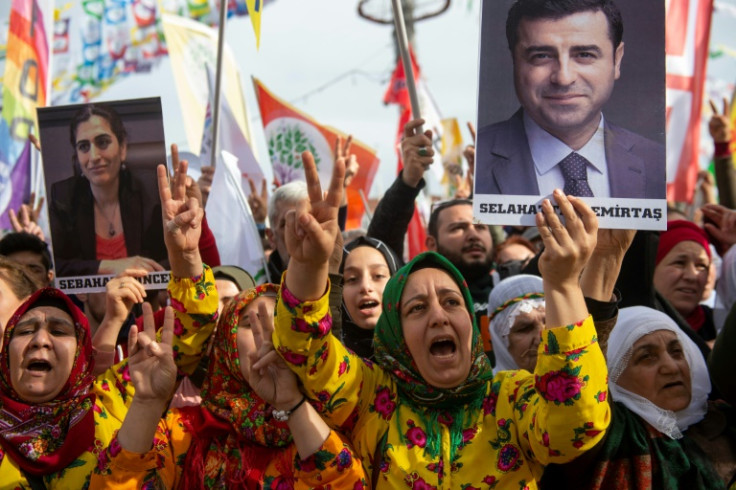Demirtas: Erdogan's Kurdish Nemesis Condemned To Prison

Languishing behind bars since 2016, Selahattin Demirtas has waged a relentless battle against Turkish President Recep Tayyip Erdogan while profoundly expanding the national appeal of his leftist pro-Kurdish party.
A telegenic former lawyer who ran against Erdogan twice -- the second time from jail -- Demirtas has transformed his Peoples' Democratic Party (HDP) into a mainstream force that makes up the third-largest voting bloc in parliament.
Called "Selocan" (my darling Selo) by his admirers and a "terrorist" by Erdogan, the 51-year-old was on Thursday sentenced to 42 years in prison over deadly 2014 protests instigated by the Islamic State group's attack on the Syrian border town of Kobane.
Western governments view Demirtas as a political prisoner who is being punished for the crime of being a popular Kurd who helped briefly break Erdogan's control of parliament in 2015.
The Turkish leader regained it within a few months by calling a snap election.
But the HDP's enduring appeal has given Kurdish voters a powerful voice and shaken up the political calculations of Turkey's traditional parties.
Erdogan has since allied his Islamic-rooted party with a hard-right group that has set the government on an ever more socially conservative course.
The HDP's strident support for worker and LGBTQ rights has made it popular with younger, urban, non-Kurdish voters who feel left out of the Turkish political debate.
But Demirtas and the HDP's historic success -- the party picked up six million votes and grabbed 80 out of parliament's 550 seats in 2015 -- has come at a painful political price.
Erdogan's government is trying to ban the HDP over alleged "terrorist" ties. And the party was replaced by DEM in the parliament.
Demirtas watched last year's presidential campaign from his jail cell in the northwestern city of Edirne, where he spoke to reporters through lawyers and tweeted out ideas about defeating Erdogan.
He himself was no longer eligible because of his legal woes and wanted his party to back the joint opposition candidate for president instead of fielding its own.
The HDP backed the opposition candidate who was defeated by Erdogan in the presidential run-off. The defeat prompted Demirtas to step down from active politics.
"While I continue the struggle like all my comrades from prison, I quit active politics at this stage," he said.
Demirtas was first detained in a dramatic police operation involving 200 officers, who sealed off his street in the overwhelmingly Kurdish city of Diyarbakir in November 2016.
Until then, Demirtas had been one of the lawmakers leading negotiations with Abdullah Ocalan, the imprisoned leader of the outlawed Kurdistan Workers' Party (PKK), whose brutal insurgency has claimed tens of thousands of lives.
But a tentative peace process broke down into bloody clashes in 2015-2016, when the HDP's success at the ballot box began to threaten Erdogan.
Demirtas's outspoken support for the Kurds in the ensuing violence made him a prime target for the Turkish leader.
Behind bars, he receives only rare visits, including from his wife Basak and two daughters.
He has used his time to become a prolific author, penning a novel and three other bestselling works.
Born in the Kurdish-majority southeastern city of Elazig, Demirtas was raised in a large and politically active Zaza family.
The Zaza are a Kurdish community with their own language, which is also used in parts of western Iran.
After completing studies at the prestigious Ankara University, Demirtas worked as a human rights lawyer in Diyarbakir before entering politics in 2007.
His brother Nurettin spent time in prison for attending a funeral of a top member of the PKK, before formally joining the group and reportedly fleeing Turkey.
The government accuses the HDP of having "organic" ties with the PKK, which is proscribed as a terrorist group by Ankara, the United States and the European Union.
Demirtas rejects the connection.
But he also sounded unbowed, dismissing the idea that he might ever be released under a general amnesty by Erdogan's government.
"I never expect forgiveness from anyone, especially not from Erdogan," he told AFP ahead of last year's presidential elections. "I am the one who should be pardoning Erdogan, he is the one who is guilty."


© Copyright AFP 2024. All rights reserved.






